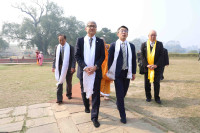National
Human Rights Watch calls on Nepal government to ensure justice for caste-based killings
Recent incidents have shown that Nepal government has systematically failed to confront entrenched caste-based discrimination against Dalits, the rights body says.
Post Report
Human Rights Watch has called on the government of Nepal to ensure justice for the recent caste-based killings.
The recent incidents have shown that Nepal government has systematically failed to confront entrenched caste-based discrimination against Dalits, said the New York-based international rights watchdog.
[Read: Serious human rights violations against Dalits reported during lockdown]
“Two recent incidents in which six people were killed show the Nepal government has systematically failed to confront entrenched caste – or descent – based discrimination against Dalits,” HRW said on Monday. “The government should ensure prompt and rigorous investigations by the police, free from political interference.”
Birendra Bhar, 25, on May 22, allegedly raped the victim Angira Pasi. Local residents, next day, caught Bhar and presented him before ward chairperson Amar Bahadur Chaudhary, who instead of taking him to the police, asked Bhar to take Pasi along as wife.
On May 23, the victim’s body was found hanging near the Rohini stream in Devdaha Municipality-11 of Rupandehi district. Bhar’s family is reported to have rejected Pasi saying that she did not belong to their caste.
On the same day, locals from Soti village in Chaurjahari Municipality in Rukum (West) had chased away Nabaraj BK of Jajarkot and 18 of his friends who had accompanied Nabaraj to the village to help him elope with a girl from the so-called upper caste. A day later, the bodies of Nabaraj and his friend Tikaram Sunar, both of them Dalits, were found on the banks of the Bheri river.
The bodies of Ganesh Budha, Lokendra Sunar and Ganesh Budha, who went missing in the river, were recovered from the river that borders the districts of Jajarkot and Rukum (West) in Karnali Province. Meanwhile, search is underway for Gobinda Shahi of Bheri Municipality Ward No. 11.
In the case of Pasi, who was allegedly raped and murdered, the police reportedly refused to register the case at first. However, the Area Police Office, Butwal, later received the complaint after pressure from the civil society.
Protests have been going on across the country demanding impartial investigations into these incidents.
A five-member team formed by the Ministry of Home Affairs started investigation into the Soti incident on May 29. However, a team of Karnali Provincial Assembly members who inspected the Soti incident has concluded that the incident was premeditated.
According to HRW, Nepal Monitor, a Nepali human rights organization, has recorded 27 incidents of caste-based discrimination or violence this year, although Dalit activists say that the vast majority of cases go unreported, and very few result in official action. “Nepal’s 2015 constitution established a National Dalit Commission to promote the rights of the Dalit – previously so-called untouchable – community, but the government has not appointed any commissioners.”
“Nepal has laws against caste-based crimes but they are rarely applied, and often the police refuse to even register cases – such as rape – when the victim is a Dalit,” said Meenakshi Ganguly, South Asia director of the Human Rights Watch. “The alleged role of local politicians in these cases can lead to obstruction of justice, which means that an independent investigation is essential.”
The United Nations has already condemned the killing of five Dalit men in Rukum (West) and other incidents of caste-based discirmination and violence in Nepal and called for independent investigation.
Issuing a statement, UN High Commissioner for Human Rights Michelle Bachelet expressed shock in the Soti incident and other incidents of caste-based discrimination and violence that have taken place during the Covid-19 pandemic.
“Despite constitutional guarantees, impunity for caste-based discrimination and violence remains high in Nepal,” said the UN human rights chief. “Covid-19 pandemic has made Dalits more vulnerable, and that since the start of Nepal’s lockdown in March there have been reports of rape, assault, denial of funeral rites, and discrimination at quarantine sites.”
“The Nepali government frequently cites ‘preserving communal harmony’ as a justification for assuming draconian new powers, but it doesn’t use the laws it already has to address caste discrimination,” Ganguly said. “These horrific crimes continue because the government has failed for too long to protect its most vulnerable citizens.”




 9.12°C Kathmandu
9.12°C Kathmandu














